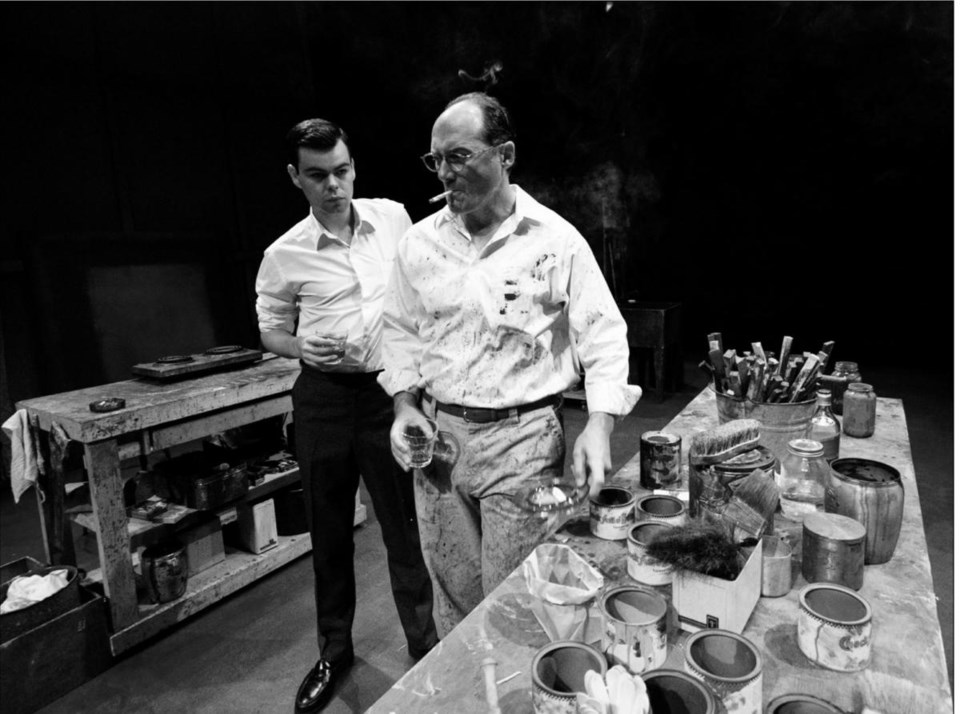REVIEW
What: Red
Where: Belfry Theatre
When: To Oct. 14
Rating: 3 1/2 stars (out of five)
Making film and theatre about painters is a challenge. That's because watching an artist daub his canvas isn't as exciting as the exploits of fighter pilots, boxers or comic-book superheroes.
In his 2009 play Red, playwright John Logan bravely tackles the life of abstract expressionist Mark Rothko. Rothko, who committed suicide in 1970, was an interesting and dynamic character. Fiercely intellectual, passionately uncompromising, he railed against critics and those who failed to take art - particularly his art - seriously.
On the Belfry Theatre's stage, the results are mostly good, although this play of ideas is on the talky side. Logan has struggled valiantly to make Red an active bio-drama. Rothko (Oliver Becker) is pitted against fictitious assistant Ken (Jameson Matthew Parker). Thanks to Rothko's misanthropic rants, their mentor-protégé relationship is immediately fractious. In the second act, it gets considerable more lively when Ken - somewhat improbably - decides to give as good as he gets.
Red takes a snapshot of Rothko at a crucial time. In 1958, he was commissioned to create murals for a swanky restaurant in Manhattan's Seagram Building. It was a prestigious and lucrative gig, but Rothko was conflicted about his assignment. Would the gossiping, martini-swilling diners appreciate the blood, sweat and tears that went into his monumental red and black canvases? Was he selling out?
Logan intends to yank us into the fascinating process of artistic creation. Aided by Michael Shamata's able direction, this production succeeds in stirring the senses.
Reproductions of Rothko's canvases are beautifully lit; they become luminescent, floating, almost living things. Classical music is played throughout.
The act of painting becomes a physical, tangible thing. We see red clouds of paint powder. We watch Ken labouring as he stretches a canvas onto a frame. The play's most stirring scene is when Rothko and Ken paint a giant canvas brick red. Done with incredible zeal, it becomes a visceral experience, with paint dripping down like blood.
The play's discussions about art, which for Rothko was a life-and-death matter, are sometimes intriguing. Yet the ideas aren't quite as profound as the playwright would have us think. For instance, there's much talk about Rothko's symbolic use of black (death) and red (life). Such symbolism doubtlessly exists, but Logan hits us on the head with it too often and too bluntly.
Indeed, much of the dialogue revolves around the notion of opposites. Rothko is the rational Apollonian; his rival Jackson Pollock is the romantic Dionysian. Again, this may be true. But there's also a sense that Logan is streamlining and simplifying ideas to serve dramatic purposes - and to make Red easily digestible for middlebrow audiences. And Rothko's rants about the commodification of art - the old trope about philistines who want paintings to match their couches - seems stale.
Still, Rothko's non-compromising personality and steel-toed integrity is a bracing tonic. His response when someone tells him a painting is "beautiful" is pure Johnny Rotten: "I want to vomit!" Good for him.
Becker, a veteran actor, brings a clipped intensity and precision to Rothko that works well. On Thursday, he seemed to search for the character during Act I. But after intermission, Becker roared on stage, successfully connecting Rothko's intellect and passion.
A problem in this twoactor play is the lack of chemistry between Becker and Parker. Parker's portrayal seemed stiff and sometimes even anemic. When he spoke of the shocking death of his parents, his laconic delivery was unconvincing. Ditto for when Ken ultimately rears up to rebel against Rothko (admittedly a problem within the script itself - Logan's quest for drama steers close to melodrama).
Overall, Red benefits from the Belfry's thoughtful treatment. Those interested in art and artists will find this production worth seeking out.



